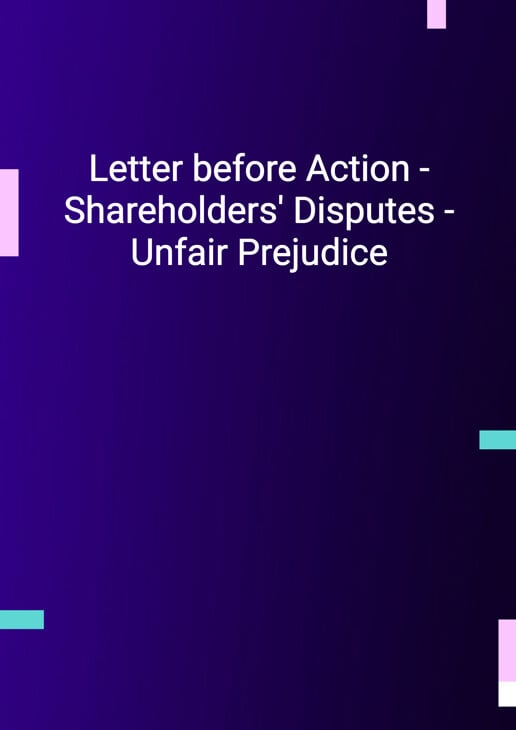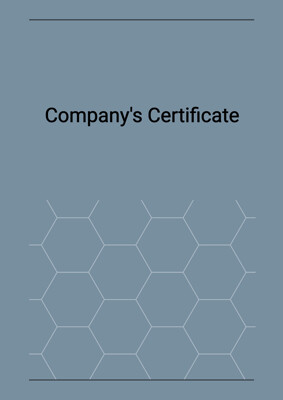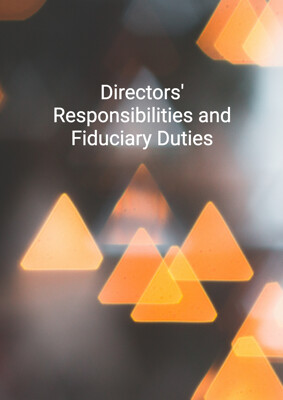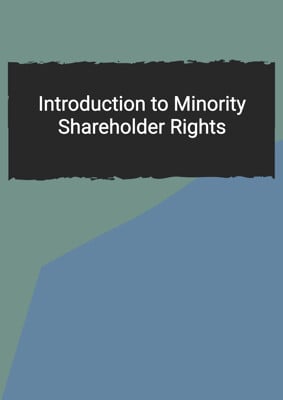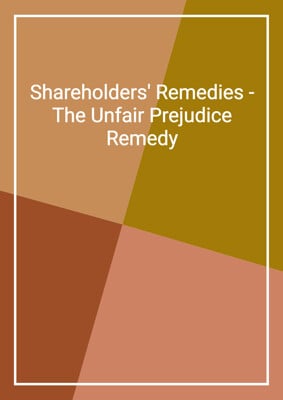How to Tailor the Document for Your Need?
01
Create Document
Click "Create Document" button and the document will be prepared with your account details automatically filled in.
02
Fill Information
Please fill in any additional information by following the step-by-step guide on the left hand side of the preview document and click the "Next" button.
03
Get Document
When you are done, click the "Get Document" button and you can download the document in Word or PDF format.
04
Review Document
Please review the document carefully and make any final modifications to ensure that the details are correct before sending to the addressee.
Document Preview
Document Description
The document titled 'Letter before Action - Shareholders' Disputes - Unfair Prejudice' is a formal letter written by a minority shareholder of a company to complain about the unfairly prejudicial conduct of the majority shareholder. The letter serves as a precursor to potential legal action and outlines the background, complaints, and relief sought by the minority shareholder.
In the background section, the letter provides context by explaining the relationship between the minority and majority shareholders. It mentions that the majority shareholder gave the minority shareholder a minority shareholding and a directorship. It also highlights that there were discussions about the minority shareholder taking over the management of the company and sharing in the profits. However, the majority shareholder later removed the minority shareholder as a director and terminated the profit-sharing arrangement.
The letter then proceeds to outline the specific complaints raised by the minority shareholder. These complaints include:
1. Breach of shareholders' agreement and/or common understanding: The minority shareholder alleges that the majority shareholder has violated the terms of the shareholders' agreement or a common understanding between them.
2. Exclusion from management: The minority shareholder claims that they have been unjustly excluded from participating in the management of the company.
3. Excessive remuneration and inadequate dividends: The minority shareholder asserts that the majority shareholder has been receiving excessive remuneration while failing to distribute adequate dividends.
4. Misappropriation: The minority shareholder accuses the majority shareholder of misappropriating company funds or assets.
5. Mismanagement: The minority shareholder alleges that the majority shareholder has been engaging in mismanagement of the company.
6. Improper share allotment: The minority shareholder raises concerns about the improper allotment of shares by the majority shareholder.
In terms of relief sought, the minority shareholder makes the following demands:
1. If a buyout is desired, the majority shareholder should buy out the minority shareholder's shares based on a fair and independent valuation.
2. If the minority shareholder has provided a loan to the company, the company should repay the loan with interest at a specified rate per month.
3. If there has been a breach of the shareholders' agreement, the majority shareholder should pay damages.
The letter concludes by requesting a constructive reply within 14 days and warning that court proceedings may be initiated if no response is received.
Overall, this document is crucial for the minority shareholder to formally express their grievances and demand appropriate action from the majority shareholder.
How to use this document?
Guidance for using the 'Letter before Action - Shareholders' Disputes - Unfair Prejudice' document:
1. Gather all relevant information: Collect all necessary details about the parties involved, including their names, contact information, and the company's name. Ensure that the current date is mentioned.
2. Provide background information: Clearly state the background of the dispute, including the relationship between the minority and majority shareholders. Specify any agreements or understandings that were previously in place.
3. Outline the complaints: Clearly list each complaint raised by the minority shareholder. Be specific and provide supporting evidence or examples where possible.
4. Specify desired relief: Clearly state the desired outcome or relief sought by the minority shareholder. If a buyout is desired, specify that the majority shareholder should buy out the minority shareholder's shares based on a fair and independent valuation. If a loan has been provided, specify the repayment terms. If damages are sought, clearly state the amount or method of calculation.
5. Set a deadline for response: Request a constructive reply within a specific timeframe, typically 14 days. Clearly state that failure to respond may result in court proceedings.
6. Review and finalize: Carefully review the letter for accuracy, clarity, and completeness. Make any necessary revisions before finalizing the document.
7. Send the letter: Deliver the letter to the intended recipient(s) through a reliable and trackable method, such as certified mail or email with read receipts.
8. Consider legal advice: Depending on the complexity of the dispute and the desired outcome, it may be advisable to seek legal advice from a qualified professional. They can provide guidance on the specific legal implications and potential strategies for resolution.
Note: This guidance is provided for informational purposes only and does not constitute legal advice. It is recommended to consult with a legal professional for specific advice tailored to your situation.
Not the right document?
Don’t worry, we have thousands of documents for you to choose from:
